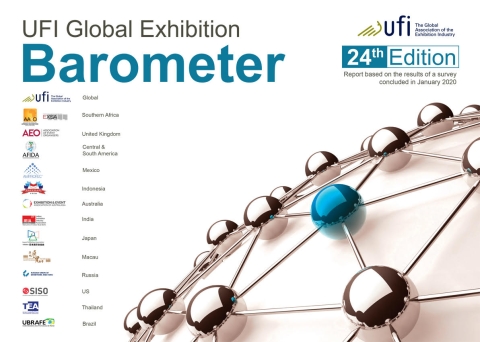UFI’s Latest Global Barometer Highlights Festivalization of Exhibitions, Growing Uncertainty

UFI, the Global Association of the Exhibition Industry, today released the latest edition of its Global Barometer research, which measures the state of the global exhibition industry. Among the highlights: strong industry performance overall for 2019, but also high uncertainty looking ahead for this year in regions such as Asia-Pacific and Latin America. (Note: This research was conducted before the coronavirus outbreak, which may be impacting outlook.)
“Exhibitions grew again in 2019, but a slowdown is expected for the beginning of 2020,” says Kai Hattendorf, managing director and CEO of UFI. “The novel coronavirus outbreak, which has already led to many shows being postponed or cancelled in China and Asia, will impact this as well.”
He continued, “We all hope this situation settles quickly, as the exhibition industry is using these results to shape its general development plans and how it’s adapting to the continually evolving classic business model.”
In good news, at least 70 percent of companies in each of the four measured regions included in the research reported maintaining a good level of performance in 2019 compared to 2018, in terms of operating profit. However, the majority of companies from all regions expect an increase in gross turnover.
Even prior to the coronavirus issue, many companies indicated uncertainty with the state of the industry—particularly in Argentina, China, Macau, Japan, Mexico and the U.K. Results of the research indicate that the key issue remains “the state of the economy at home” (chosen by 26 percent of respondents), ahead of “competition within the industry” (20 percent) and “global economic developments (19 percent). As with recent editions of the long-running UFI research, there is an increased focus on the national/regional economy as opposed to global economic development.
The global scope of the Barometer points out how strategic priorities in each market compare. For example, “While the development of the economy in the home market [globally] is the most pressing concern, the U.S. is notably less concerned there,” says Hattendorf. “By contrast, the industry in the U.S. is more concerned about the impact of digitization and of regulatory and stakeholder issues, compared to the global average.”
The report also covers the evolution of the exhibition model and to what extent certain features are being implemented. For example, results indicate a major use of conference stages on and near the showfloor (rated 3.6 on a scale of 5, indicating the degree to which show organizers add this element to shows). This was followed by use of open meeting spaces (2.9) and catering and designated food spaces (2.8). Off-site main events, on the other hand, were implemented less often (2).
With regard to having conference stages on and near the showfloor, 33 percent of respondents indicated that these stages used between 10 and 25 percent of the show’s total space.
“Call it ‘festivalisation,’ call it ‘ConfEx’ — the business model of exhibitions keeps evolving,” says Hattendorf. “The Barometer shows that, globally, the core elements of these trends are by now well understood around the world… but their use differs.”
When it comes to strategy, show organizers are increasingly looking to develop new activities, either in the classic range of exhibition industry activities or moving outside current portfolios. Broken down by region, 93 percent of companies in the Americas intend to do this, followed by 90 percent in Europe and 87 percent in the Middle East. Additionally, about one-third of companies have intentions to develop operations in new countries.
To access the full report from UFI for free, go here. The next UFI Global Barometer survey will be conducted in June 2020.


Add new comment